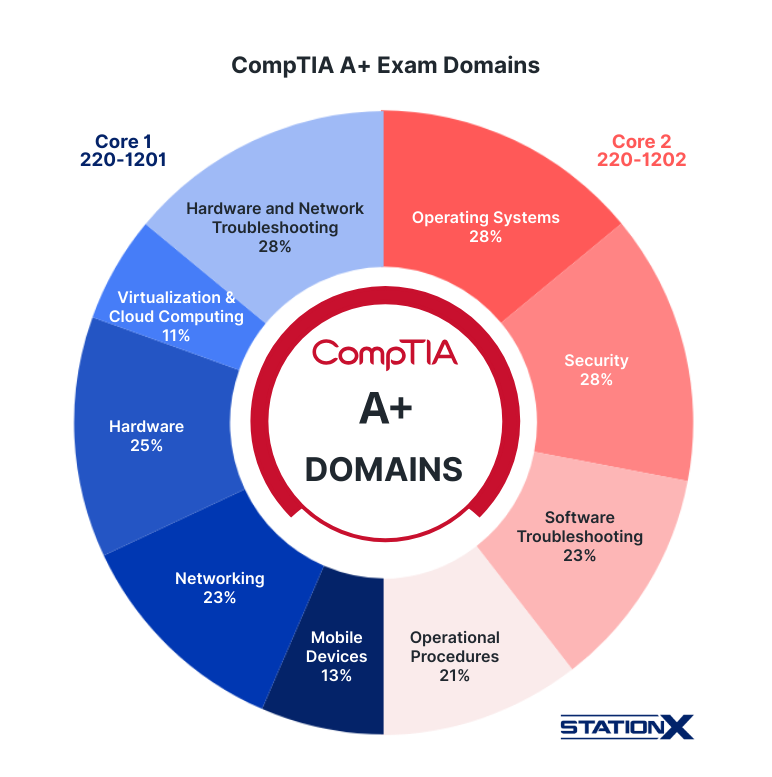Have you ever wondered what jobs are open to you if you get A+ certified? Is there any proof of the promising claims by various sources of high-paying employment after you get A+ certified?
Look no further: we’ve put this article together to show you how the A+ certification can accelerate your transition into an IT career, especially if you come from a non-IT background.
To make such a career leap, proper study, planning, and knowing your next steps after getting a certification are important. Thanks to what you’ll learn here, you’ll know how much CompTIA A+ jobs are worth the time and effort you’ll have spent studying for this certification.
Without further ado, let’s dive in and explore salaried A+ certification jobs you can pursue.
Overview of the CompTIA A+ Certification
CompTIA is short for “Computing Technology Industry Association.” To obtain the CompTIA A+ certification, an individual must pass two exams:
- Core 1 focuses on hardware, cloud computing, and networking technology, and
- Core 2 is about software, operating systems, and cyber security basics.
Here’s the detailed breakdown of the latest Core 1 and Core 2 domains:

Refer to our A+ cheat sheet for details.
What Does the CompTIA A+ Certification Prepare You For?
CompTIA A+ certification prepares individuals for various entry-level IT jobs, especially in technical support. In this section, we’ll discuss the most common careers that new A+ certification holders embark upon.
Help Desk Technician
If you’ve ever used an online service, such as website hosting or Anything-as-a-Service (XaaS, e.g., IaaS, PaaS, SaaS, VCaaS), chances are you’ve sought help from one or more help desk technicians.
These specialized customer service representatives use their knowledge of computer systems, hardware, and software to help troubleshoot problems that arise. They must have excellent interpersonal skills to interact with customers, whether on a phone call, via text chat, or in person.
Desktop Support Technician
Desktop support technicians maintain a firm’s IT infrastructure, such as updating systems with the latest hardware and software as needed and providing technical support to individuals remotely or in person. Good desktop support technicians tailor their services to support end-user access.
They focus on troubleshooting organizational computer systems, desktop computers, laptops, and associated peripherals such as monitors, keyboards, mice, central processing units (CPUs), and printers. Their work includes installing, diagnosing, repairing, maintaining, and upgrading all organizational hardware and equipment while ensuring optimal workstation performance.
IT Support Specialist
IT support specialists help keep employees productive by providing technical assistance to corporate clients, and they assist external company customers via the telephone or online text chat. Their duties include ensuring the optimal use of hardware and software technologies, including upgrades, enhancing system performance, and securing data.
IT support specialists may instruct their business clients on how to use business-specific programs or work with other technicians to resolve problems within the company. They may answer technical questions from customers of their business clients, like re-establishing internet connections or troubleshooting household IT products like Wi-Fi routers.
Field Service Technician
Field service technicians travel to client locations to install new equipment, respond to service requests, troubleshoot equipment issues, and supply employees with technical training on company equipment. They provide technical support, repairs, and maintenance tasks for customers and diagnose errors or technical problems that arise during their visit.
Good field service technicians listen attentively to the client’s concerns before diagnosing the problem and providing a suitable solution.
Computer Repair Technician
A computer repair technician diagnoses and troubleshoots various issues affecting computer systems and networks. They may perform physical work, such as moving computer hardware around. Similar to a field service technician, this role requires onsite presence. Computer repair technicians may also repair mobile devices depending on specific job requirements.
Apart from technical skills, computer repair technicians should also have excellent communication skills, as they must explain technology to non-technical people in person or via phone or text. They may need to work flexible hours.
Job Opportunities and Salary
Many job opportunities abound for A+ certified individuals, especially the job types listed above. Prudent job seekers would do well to remember the various job titles which seek A+ holders.
Here’s a snapshot from LinkedIn’s job search in the United States alone, with the number of results for CompTIA A+ in the description exceeding 33,000:

On the first two pages of this LinkedIn query, you can find variations in job titles, such as:
- Adjunct Technical Faculty - Computer Information Systems
- Collection Systems Technician II
- Computer Help Desk Support
- Distributed computer systems analyst
- Desktop Support Specialist
- Electronic Duplicating System Technician
- Field Service Technician
- Help Desk / Analyst / IT / Technician / Manager
- IT Help Desk Analyst / Support
- IT Junior Field Technician Administrator
- IT Operations Technician
- IT Support / Help Desk / Analyst / Specialist / Technician / Technical Support Specialist / Workforce Administrator
- Information Systems Administrator
- Junior Engineer / System Administrator
- Network Technician - Helpdesk
- Systems Engineer Senior
- Technical Support / Support Representative / Support Specialist
- Technology Support Specialist
Compare the above with the search results of the Cisco certification most similar to A+: the CCST. It’s far less popular than A+, with only 157 results in the following screenshot:

Now let’s go back and look at the CompTIA A+ results on LinkedIn to find out what employers want from a prospective or current A+ holder like yourself.
From the LinkedIn search results above, we’ve found a job that doesn’t explicitly specify CompTIA A+. Nevertheless, it requires experience in Active Directory and basic hardware troubleshooting, both of which the A+ exams cover. As for Microsoft 365, anyone who has worked with Microsoft Word, Excel, and PowerPoint already has relevant experience.

As the following example on the technology career website Dice shows, the job titles requiring A+ may be unexpected:

Here’s an example on Glassdoor of a Desktop Support Technician job listing requiring CompTIA A+:

Combing through our search results in Glassdoor, which lists salaries for most job ads displayed, we’ve compiled a few tables showing the approximate salary range of the five job types above.
While there are a lot of job postings and job titles that mention A+ certification as a requirement, it’s important to understand that A+ alone is just one certification that can help you qualify for these roles. Many listings also expect you to have 3 to 5 years of experience, additional credentials like CCNA or Security+, or advanced technical skills.
Therefore, in the following section, we will focus specifically on jobs that you can start seeking out after you earn your A+ certification alone, without needing other certifications or years of prior experience.
| Job Title | Salary Range | What Else You’ll Need |
|---|---|---|
| Help Desk Technician | $48K– 57K | Basic ticketing systems, customer support, and PC troubleshooting |
| IT Support Specialist | $56K – 65K | Windows/Office 365 support, remote tools, user account setup |
| Field Service Technician | $55K – 62K | On-site hardware/software repair skills |
| Desktop Support Specialist | $60K – 61K | Hardware/software configuration, customer communication |
You’ll find thousands of open positions referencing or requiring CompTIA A+ certification. For example, at the time of writing, a search on Glassdoor for US-based jobs mentioning CompTIA A+ returns over 2,500 results.
At the same time, Indeed lists over 2,000 US-based job postings that include CompTIA A+ in their descriptions.
Below are a few specific job listings we identified (company names have been removed, and the postings have been summarized):
IT Support Technician
On-site, $46K – $63K
Provides technical support for end users, including diagnosing and troubleshooting software, hardware, and operating systems via phone, email, portal, or chat. Requires excellent written and verbal communication skills, a positive attitude, and strong customer service focus.
Desktop Support Specialist
Hybrid, $35/hour
Serves as the primary IT contact supporting end users, resolving technical issues, and maintaining smooth IT operations across divisions. Requires solid technical skills, strong problem-solving ability, and excellent communication to deliver reliable support.
IT Support Specialist
On-site, $55K–$60K
Resolves software, hardware, and connectivity issues remotely. Delivers strong customer service, documents all support activity, escalates complex problems, and assists with tech projects as needed.
Field Service Technician
Remote, $50K–$60K
Installs and verifies explosion mitigation systems, trains plant staff, handles emergencies, prepares reports, manages travel and expenses, quotes spare parts or services, and ensures all work meets safety and quality standards.
Career Progression
Could the positions above be feeder roles to intermediate and advanced functions, such as network engineer and cyber security professional? The answer is yes.
Once you’ve gained your A+, you’ll have built a foundation on which to further your studies and career, as illustrated in the roadmap below:

Your logical next step would be to have a solid understanding of networking, which can help you break into a career in cyber security. Check our Cyber Security Jobs for opportunities and positions.
If you already hold your A+, consider moving directly into CompTIA Network+, Cisco CCNA, or even Cisco CCNP. These respected certifications demonstrate comprehensive networking knowledge and signal to employers that you’re ready to tackle more advanced security-focused roles.
Over time, this progression helps you build a clear career path from entry-level IT support positions into specialized areas like network administration, cyber security analysis, and infrastructure engineering. As you gain experience and add higher-level credentials, you’ll qualify for senior roles with greater responsibility, higher salaries, and opportunities to lead technical teams or manage large-scale projects.
For such a purpose, CompTIA has created stackable certifications, which means that, by taking CompTIA certifications at a higher level than A+, you’re getting prepared for specific IT careers as outlined above:


The CompTIA certifications CySA+ and PenTest+ are particularly in demand for those who wish to specialize in cyber security.
A+ Certification Jobs Conclusion
We hope this brief overview of CompTIA A+ jobs gives you a clear idea of career expectations once you get A+ certified.
Looking to pass your CompTIA A+ exam with confidence? We’ve got two excellent options to help you prepare. You can get lifetime access to the Complete CompTIA A+ Training Bundle (Version 15), which includes 40+ hours of online video training for Core 1 and Core 2, full-length practice exams, and flashcards to boost memorization and retention.
Or, for a broader learning experience, you can join the StationX Master’s Program, which offers access to more than 30,000 cyber security courses and hands-on labs covering everything from foundational IT skills to advanced cyber security techniques. Don’t forget to pick up A+ exam Core 1 and Core 2 vouchers at a great discount.






